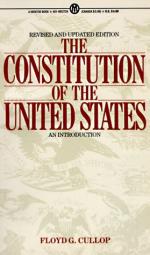
|
| Name: _________________________ | Period: ___________________ |
This test consists of 15 multiple choice questions and 5 short answer questions.
Multiple Choice Questions
1. Amendment 14, Section 1 (1868) stipulates no state can make laws that do what to citizens of the U.S.?
(a) Take away, restrict any rights, privileges, protections.
(b) Take away, restrict any rights, privileges, protections except in war.
(c) Take away, restrict any rights, privileges, protections except in military.
(d) Take away, restrict any rights, privileges, protections except for juveniles.
2. Amendment 18 (1919) states that the manufacture, sale and transportation of alcoholic beverages is illegal beginning when?
(a) 90 days after the ratification of this amendment.
(b) Immediately upon ratification of this amendment.
(c) 30 days after the ratification of this amendment.
(d) 1 year after the ratification of this amendment.
3. Amendment 25, Section 2 (1967) stipulates if there is a vacancy in the office of Vice President, who fills the vacancy?
(a) Speaker of the House.
(b) Secretary of State.
(c) President designates.
(d) President nominates, Congress confirms.
4. Being tried again for a crime already found not guilty of is the definition of what?
(a) Double jeopardy.
(b) Indemnity.
(c) Double indemnity.
(d) Jeopardy.
5. Amendment 11 (1798) changes Article 3, Section 2, and states that a civil or equity suit brought against a state by a citizen of another state or from a foreign country may be tried where?
(a) Sate court of state where citizen filing lawsuit resides.
(b) National court of foreign country where citizen filing lawsuit resides.
(c) Federal court.
(d) State court of state against which lawsuit is filed.
6. Which freedom can be found in Amendment 1?
(a) Citizens are free to marry anyone of their choosing.
(b) Congress cannot pass a law establishing a national religion.
(c) Citizens are free to attend the educational institution of their choice.
(d) Citizens are free from military service except during national invasion.
7. The government may pass laws regarding the ownership of certain weapons in the way in which they are used is addressed in which amendment?
(a) 5.
(b) 4.
(c) 2.
(d) 3.
8. What are the first ten amendments to the Constitution called?
(a) Bill of Freedoms.
(b) Bill of Acceptance.
(c) Bill of Rights.
(d) Bill of Liberties.
9. Amendment 22 (1951) declares that a President may not serve more than two terms, but did not apply to which President who was in office when it was proposed?
(a) Dwight D. Eisenhower.
(b) Franklin D. Roosevelt.
(c) Harry S. Truman.
(d) Herbert Hoover.
10. Common law refers to which term?
(a) Civil law.
(b) Criminal law.
(c) Religious affairs.
(d) Military law.
11. Which is among the rights of an individual accused of crime?
(a) A jury of their choosing to ensure impartiality.
(b) Any counsel of their choosing will be provided free of charge.
(c) To hear the testimony of witnesses.
(d) A judge of their choosing to ensure impartiality.
12. Any powers not denied them by the Constitution, and that are not the exclusive powers of the U.S. government, are whose?
(a) States and people.
(b) Individuals.
(c) Municipalities.
(d) Counties.
13. What does Amendment 12 (1804) also address the importance of?
(a) Secret ballot.
(b) Congressional vote.
(c) Free vote.
(d) Electoral vote.
14. Amendment 14, Section 1 (1868) stipulates anyone born in the U.S. and governed by it is what type of citizen?
(a) U.S. and country where he was born.
(b) U.S. and state in which he was born.
(c) Naturalized.
(d) U.S. and state in which he resides.
15. Amendment 14, Section 2 (1868) stipulates that representatives to Congress be elected in each state according to what?
(a) Territorial size.
(b) Tax income percentage.
(c) Durable goods production size.
(d) Population size.
Short Answer Questions
1. According to Amendment 17 (1913), when a state has a Senate vacancy, who can make a temporary appointment?
2. Which freedom is included in Amendment 1?
3. "Room and board" means what?
4. Congress was given the power to do away with Section 3 of Amendment 14, concerning certain supporters of the Confederacy, by a 2/3 vote, and did so in what year?
5. Amendment 24 (1964) prohibits denial of the right to vote because of what?
|
This section contains 657 words (approx. 3 pages at 300 words per page) |

|




